- Home
- Dennis Lehane
Gone, Baby, Gone
Gone, Baby, Gone Read online
DENNIS
LEHANE
GONE, BABY, GONE
To my sister, Maureen, and my brothers, Michael,
Thomas, and Gerard:
Thanks for standing by me and
putting up with me.
It couldn’t have been easy.
And to
JCP
Who never stood a chance.
Contents
AUTHOR’S NOTE
PART ONE: INDIAN SUMMER, 1997
1 Each day in this country, twenty-three hundred children are reported…
2 From a detective’s perspective once you rule out running away…
3 Helene McCready was watching herself on TV when we entered…
4 The section of Dorchester Avenue that runs through my neighborhood…
5 When we stepped out of the bar into the alley,…
6 The Astros were playing the Orioles in a sunset game…
7 After the game, we stopped in the Ashmont Grille for…
8 After her estrangement from Phil and before she and I…
9 Amanda McCready wasn’t smiling. She stared at me with still,…
10 When Winthrop and the original settlers arrived in the New…
11 “Gee two hundred?” Angie said.
12 Cheese Olamon was a six-foot-two four-hundred-and-thirty-pound yellow-haired Scandinavian who’d some…
13 Broussard caught up with me as we made our way…
14 I’d heard about Chris Mullen’s banker’s hours, his determination to…
15 An hour later, Angie opened the passenger door of the…
16 One of the things that happens when you follow scumbags…
17 Major John Dempsey of the Massachusetts State Police had a…
18 If you head south out of my neighborhood and cross…
19 We landed on the bunny slope of the Blue Hills…
20 When dawn arrived, we were still there as the tow…
21 “DEA?” Angie said. “You’re kidding.”
22 The sleet that had visited us briefly last night had…
PART TWO: WINTER
23 Five months passed, and Amanda McCready stayed gone. Her photograph—in…
PART THREE: THE CRUELEST MONTH
24 By early April, Angie was spending most nights with her…
25 “Ange!” I called, as Bubba and I came bounding into…
26 It took twenty hours to confirm that the body in…
27 It was one very drunk cop I met in the…
28 I sat for a long time in the ashen, half-dark…
29 It seemed like every other guy on the Narcotics, Vice,…
30 In the blind hope that it might make a difference,…
31 “Lionel’s gone,” Beatrice said.
32 At the end of an April day, after the sun…
33 I followed Broussard’s trail across Broadway and up C Street,…
34 “…at which point the man later identified as Detective Pasquale…
35 “Before forming CAC,” Oscar said, “Doyle was Vice. He was…
Epilogue
The Mother and Child Reunion, as the headline of the…
Acknowledgments
About the Author
Praise
Other Books by Dennis Lehane
Copyright
About the Publisher
AUTHOR’S NOTE
Anyone familiar with Boston, Dorchester, South Boston, and Quincy, as well as both the Quincy quarries and the Blue Hills Reservation, will realize that I have taken enormous liberties in describing their geographical and topographical particulars. This was wholly intentional. While these cities, towns, and areas do exist, they have been altered according to the demands of story, as well as my own whims, and therefore should be regarded as entirely fictitious. Further, any similarities between the characters and events in this narrative and real persons, living or dead, is entirely coincidental.
Port Mesa, Texas
October 1998
Long before the sun finds the Gulf, the fishing boats set out into the dark. Shrimpers mostly, an occasional pursuer of marlin or tarpon, the boats are filled almost exclusively with men. The few women who do work the shrimpers keep mostly to themselves. This is the Texas coast, and because so many men have died hard over two centuries of fishing, their offspring and surviving friends feel they’ve earned their prejudices, their hatred of the Vietnamese competitors, their mistrust of any woman who’d do this ugly work, fumble in the dark with thick cable and hooks that slice through knuckles.
Women, one fisherman says in the black predawn, as the captain cuts the trawler engine to a low rumble and the slate sea roils, should be like Rachel. That’s a woman.
That’s a woman, all right, another fisherman says. Goddamn, yes, sir.
Rachel is relatively new to Port Mesa. Showed up back in July with her little boy and a battered Dodge pickup, rented a small house on the north side of town, took the HELP WANTED sign out of the window of Crockett’s Last Stand, a wharf bar perched atop ancient pilings that sag toward the sea.
Took months before anyone even learned her last name: Smith.
Port Mesa attracts a lot of Smiths. A few Does, too. Half the shrimpers are manned by men running from something. Sleeping when most of the world is awake, working while most of it sleeps, drinking the rest of the time in bars few strangers feel comfortable entering, they follow the catch and the seasons, work as far west as Baja, as far south as Key West, and they get paid in cash.
Dalton Voy, owner of Crockett’s Last Stand, pays Rachel Smith in cash. Would pay her in gold ingots if she wanted. Ever since she took her place behind the bar, business has jumped twenty percent. Strange as it is, there are fewer fights, too. Usually the men step off the boats with the sun baked straight through their flesh and into their blood, and it makes them irritable, quick to end a discussion with the swing of a bottle, the snap of a pool stick. And when beautiful women are around, in Dalton’s experience—well, it just makes the men worse. Quicker to laugh, but quicker to take offense.
Something about Rachel, though, calms the men.
Warns them, too.
It’s in her eyes—a quick something that flashes mean and cold when someone steps over the line, touches her wrist too long, makes a sex joke that isn’t funny. And it’s in her face, the lines etched there, the weathered beauty of it, the sense of a life lived before Port Mesa that knew more dark dawns and hard facts than most of the shrimpers.
Rachel packs a gun in her purse. Dalton Voy saw it once by accident, and the only thing that surprised him about it was that it didn’t surprise him at all. Somehow he’d known. Somehow everyone else did, too. No one ever approaches Rachel in the parking lot after work, tries to talk her into his car. No one follows her home.
But when that hard thing isn’t in her eyes, and that distance has left her face, man, she lights the place up. She moves up and down that bar like a dancer; every twist and pivot, every tilt of a bottle is smooth and fluid. When she laughs it opens her mouth wide and explodes in her eyes, and everyone in the bar tries to come up with a new joke, a better one, just to feel the thrill of that laugh in their spines again.
And then there’s her little boy. Beautiful blond boy. Doesn’t look anything like her, but when he smiles, you know he’s Rachel’s. Maybe a little moody like her, too. You see warning in his eyes sometimes, strange in a child so young. Barely old enough to walk, already showing the world something that says, Don’t push.
Old Mrs. Hayley watches the boy when Rachel’s at work, and she tells Dalton Voy once that you couldn’t ask for a better behaved boy, or one who so openly loves his mama. She says that boy is going to be something special. President or something. War hero. You mark my words, Dalton. You ma
rk ’em.
One sunset at Boynton’s Cove, Dalton takes his daily walk and comes upon mother and son. Rachel is waist-deep in the warm Gulf, holding the boy under his arms, dipping him up and down in the water. The water is gold, silky in the dying sun, and it seems to Dalton that Rachel purifies her son in gold, performs some ancient rite that will coat his flesh so it can’t be pierced or torn.
The two of them laugh in the amber sea, and the sun dips red behind them. Rachel kisses her son’s neck and props his calves over her hips. He leans back in her hands. And they look into each other’s eyes.
Dalton thinks maybe he’s never seen anything as beautiful as that look.
Rachel doesn’t see him, and Dalton, he doesn’t even wave. Feels like an intruder, actually. He keeps his head down, walks back up the way he came.
Something happens to you when you stumble on love that pure. It makes you feel small. Makes you feel ugly and ashamed and unworthy.
Dalton Voy, watching that mother and son playing in the amber water, has realized a cold, simple truth: He’s never, not for one second, been loved like that in his life.
Love like that? Hell. It seems so pure, it’s damn near criminal.
PART ONE
INDIAN SUMMER, 1997
1
Each day in this country, twenty-three hundred children are reported missing.
Of those, a large portion are abducted by one parent estranged from the other, and over fifty percent of the time the child’s whereabouts are never in question. The majority of these children are returned within a week.
Another portion of those twenty-three hundred children are runaways. Again, the majority of them are not gone long, and usually their whereabouts are either known immediately or easily ascertained—a friend’s house is the most common destination.
Another category of missing children is the throwaway—those who are cast out of their homes or who run away, and the parents decide not to give chase. These are often the children who fill shelters and bus terminals, street corners in the red-light districts, and, ultimately, prisons.
Of the more than eight hundred thousand children reported missing nationally every year, only thirty-five hundred to four thousand fall into what the Department of Justice categorizes as Non-Family Abductions, or cases in which the police soon rule out family abductions, running away, parental ejection, or the child becoming lost or injured.
Of these cases, three hundred children disappear every year and never return.
No one—not parents, friends, law enforcement, childcare organizations, or centers for missing people—knows where these children go. Into graves, possibly; into cellars or the homes of pedophiles; into voids, perhaps, holes in the fabric of the universe where they will never be heard from again.
Wherever these three hundred go, they stay gone. For a moment or two they haunt strangers who’ve heard of their cases, haunt their loved ones for far longer.
Without a body to leave behind, proof of their passing, they don’t die. They keep us aware of the void.
And they stay gone.
“My sister,” Lionel McCready said, as he paced our belfry office, “has had a very difficult life.” Lionel was a big man with a slightly houndish sag to his face and wide shoulders that slanted down hard from his collarbone, as if something we couldn’t see sat atop them. He had a shaggy, shy smile and a firm grip in a callused hand. He wore a brown UPS deliveryman’s uniform and kneaded the brim of the matching brown baseball cap in his beefy hands. “Our mom was a—well, a boozer, frankly. And our dad left when we were both little kids. When you grow up that way, you—I guess you—maybe you got a lot of anger. It takes some time to get your head straight, figure out your way in life. It’s not just Helene. I mean, I had some serious problems, took a hard bust in my twenties. I was no angel.”
“Lionel,” his wife said.
He held up a hand to her, as if he had to spit it out now or he’d never spit it out at all. “I was lucky. I met Beatrice, straightened my life out. What I’m saying, Mr. Kenzie, Miss Gennaro, is that if you’re given time, a few breaks, you grow up. You shake that crap. My sister, she’s still growing up, what I’m saying. Maybe. Because her life was hard and—”
“Lionel,” his wife said, “stop making excuses for Helene.” Beatrice McCready ran a hand through her short strawberry hair and said, “Honey, sit down. Please.”
Lionel said, “I’m just trying to explain that Helene hasn’t had an easy life.”
“Neither have you,” Beatrice said, “and you’re a good father.”
“How many kids do you have?” Angie asked.
Beatrice smiled. “One. Matt. He’s five. He’s staying with my brother and his wife until we find Amanda.”
Lionel seemed to perk up a bit at the mention of his son. “He’s a great kid,” he said, and seemed almost embarrassed by his pride.
“And Amanda?” I said.
“She’s a terrific kid, too,” Beatrice said. “And she’s way too young to be out there on her own.”
Amanda McCready had disappeared from this neighborhood three days ago. Since then, the entire city of Boston, it seemed, had become obsessed with her whereabouts. The police had put more men on the search than they had on the manhunt for John Salvi after the abortion clinic shootings four years ago. The mayor held a press conference in which he pledged no city business would take precedence over her disappearance until she was found. The press coverage was saturating: front page of both papers each morning, lead story in all three major telecasts at night, hourly updates inserted between the soaps and talk shows.
And in three days—nothing. Not a hint of her.
Amanda McCready had been on this earth four years and seven months when she vanished. Her mother had put her to bed on Sunday night, checked in on her once around eight-thirty, and the next morning, shortly after nine, had looked in at Amanda’s bed and seen nothing but sheets dented with the wrinkled impression of her daughter’s body.
The clothes Helene McCready had laid out for her daughter—a pink T-shirt, denim shorts, pink socks, and white sneakers—were gone, as was Amanda’s favorite doll, a blond-haired replica of a three-year-old that bore an eerie resemblance to its owner, and whom Amanda had named Pea. The room showed no signs of struggle.
Helene and Amanda lived on the second floor of a three-decker, and while it was possible Amanda had been abducted by someone who’d placed a ladder under her bedroom window and pushed the screen open to gain entry, it was also unlikely. The screen and windowsills had shown no signs of disturbance, and the ground at the foundation of the house bore no ladder marks.
What was far more likely, if one assumed a four-year-old didn’t suddenly decide to leave home on her own in the middle of the night, was that the abductor entered the apartment through the front door, without picking the lock or prying the hinges loose from the jamb, because such actions were unnecessary on a door that had been left unlocked.
Helene McCready had taken a hell of a beating in the press when that information came out. Twenty-four hours after her daughter’s disappearance, the News, Boston’s tabloid answer to the New York Post, ran as its front-page headline:
COME ON IN:
Little Amanda’s Mom Left Door Unlocked
Beneath the headline were two photographs, one of Amanda, the other of the front door to the apartment. The door was propped wide open, which, police stated, was not how it was discovered the morning of Amanda McCready’s disappearance. Unlocked, yes; wide open, no.
Most of the city didn’t care much about the distinction, though. Helene McCready had left her four-year-old daughter alone in an unlocked apartment while she went next door to her friend Dottie Mahew’s house. There she and Dottie watched TV—two sitcoms and a movie of the week entitled Her Father’s Sins starring Suzanne Somers and Tony Curtis. After the news, they watched half of Entertainment Tonight Weekend Edition and then Helene returned home.
For roughly three hours and forty-five minutes
, Amanda McCready had been left alone in an unlocked apartment. At some point during that time, the assumption went, she had either slipped out on her own or been abducted.
Angie and I had followed the case as closely as the rest of the city, and it baffled us as much as it seemed to baffle everyone else. Helene McCready, we knew, had submitted to a polygraph regarding her daughter’s disappearance and passed. Police were unable to find a single lead to follow; rumor had it they were consulting psychics. Neighbors on the street that night, a warm Indian summer night when most windows were open and pedestrians strolled at random, reported seeing nothing suspicious, hearing nothing that sounded like a child’s screams. No one remembered seeing a four-year-old wandering around alone or a suspicious person or persons carrying either a child or an odd-looking bundle.
Amanda McCready, as far as anyone could tell, had vanished so completely it was as if she’d never been born.
Beatrice McCready, her aunt, had called us this afternoon. I told her I didn’t think there was much we could do that a hundred cops, half the Boston press corps, and thousands of everyday people weren’t already doing on her niece’s behalf.
“Mrs. McCready,” I said, “save your money.”
“I’d rather save my niece,” she said.

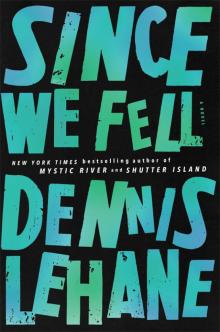 Since We Fell
Since We Fell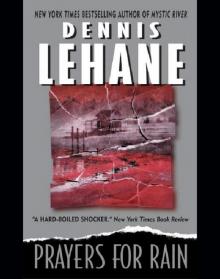 Prayers for Rain
Prayers for Rain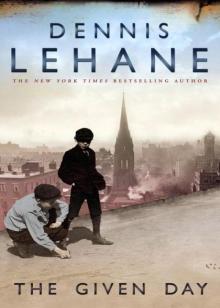 The Given Day
The Given Day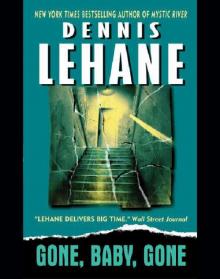 Gone, Baby, Gone
Gone, Baby, Gone Mystic River
Mystic River A Drink Before the War
A Drink Before the War Shutter Island
Shutter Island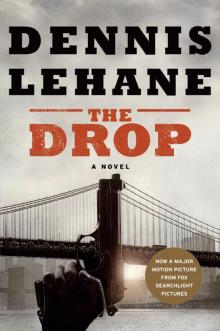 The Drop
The Drop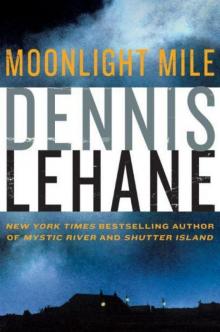 Moonlight Mile
Moonlight Mile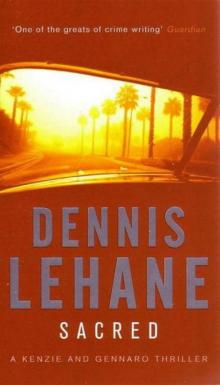 Sacred
Sacred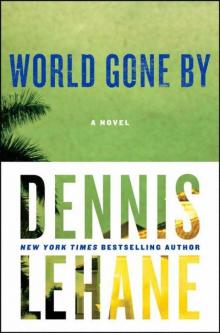 World Gone By
World Gone By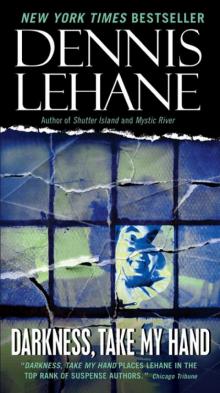 Darkness, Take My Hand
Darkness, Take My Hand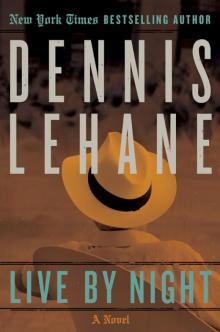 Live by Night
Live by Night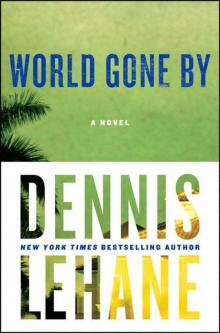 World Gone By: A Novel
World Gone By: A Novel Coronado
Coronado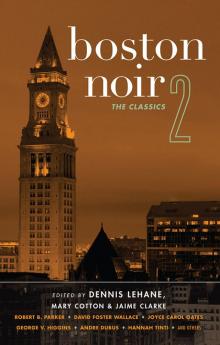 Boston Noir 2
Boston Noir 2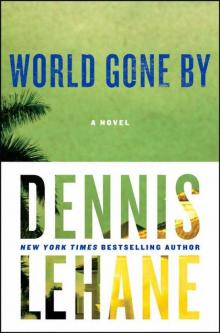 World Gone By: A Novel (Joe Coughlin Series)
World Gone By: A Novel (Joe Coughlin Series)